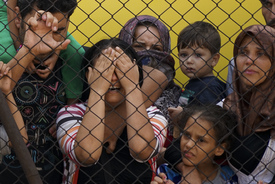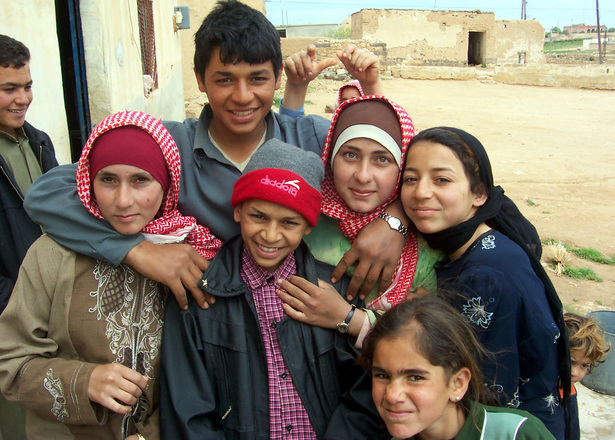Syrian Vulnerable Persons Relocation (VPR) scheme
 By Mstyslav Chernov By Mstyslav Chernov
Background
Since the beginning of the conflict in Syria in 2011 at least 6.5 million Syrians have been forced to flee their homes. Of these, more than 3 million have taken refuge in neighbouring countries: Turkey, Jordan, Lebanon and Iraq. In Lebanon this equates to roughly a quarter of the population. These countries are struggling to cope. Iraq is no longer safe, and Syrians are among those attempting to cross the Mediterranean to reach safety in Europe. The SVPR scheme In January 2014 the Home Secretary made a statement to parliament announcing the Government’s intention to relocate some of the most vulnerable Syrian refugees. As the first refugees arrived on 25th March, James Brokenshire, at the time Minister for Security and Immigration at the Home Office, made a speech in Parliament spelling out how the scheme would work: ‘Those admitted under the SVPR scheme will be granted five years’ humanitarian protection with all the rights and benefits that go with that status, including access to public funds, access to the labour market and the possibility of family reunion. We believe that the SVPR scheme will make a real difference to the lives of some of the most vulnerable Syrians displaced by the conflict by giving them protection and support in the UK.’ How it works UNHCR identifies vulnerable families who are in refugee camps near the Syrian border. At present these will be families where at least one member of the family has suffered torture or sexual abuse, has health problems, or is elderly. Families are carefully vetted for security reasons. The Government will provide funding for one year in addition to the normal rights of refugees. This funding can cover:
This provision is subject to change depending on the government's intention for unaccompanied minors. Local authorities who choose to participate in the scheme take the lead in working with other key local partners to ensure that arrivals are provided with suitable accommodation and the specific needs of these vulnerable individuals are met. This includes securing the prior sign up of local partners; for health the Clinical Commissioning Group and local NHS England Area Team and through them primary and secondary healthcare providers; and education and housing providers. Other partners can include the voluntary sector. The scheme can only be implemented through the local authority. The voluntary sector cannot be given funds directly. What rights are granted to these refugees? Those admitted under the SVPR scheme will be granted five years’ humanitarian protection with all the rights and benefits that go with that status, including access to public funds, access to the labour market and the possibility of family reunion. What happens after five years? If the situation in their country is resolved then families can return to their countries, or they can chose to apply for indefinite leave to remain in the UK. How well is the scheme working? In authorities where the SVPR scheme has been implemented it is reported to be working well and local authorities, including Hertfordshire, have found the funding to be adequate. It is important to remember that while one person per family group will need specific and ongoing support, other family members will be working and supporting the local economy. Syrians have been keen to integrate and become economically independent as soon as possible. Many are likely to have held professional and skilled jobs. We need to avoid seeing refugees as a burden: they contribute to and enrich their communities. It is significant that many in the Jewish community are supporting the scheme, drawing parallels with their own experiences in World War II. Rabbi Danny Rich says: ‘[This] isn’t an open-door immigration policy, but it is about reviving the proud British tradition of offering shelter and hope to those who are in dire need. We should look back to acts like the Kindertransport programme to give politicians the courage and support to do more now.’ Funding Central Government will meet costs of arrivals’ orientation, support, health, education, housing and adult English tuition (ESOL) for one year. After this they will be eligible for refugee rights and benefits (see James Brokenshire’s speech above). Local and specialist support There is strong support from a wide variety of faith groups and other organisations, including local Amnesty groups, and members of the community are identifying areas where they can offer practical help, such as interpreting, teaching English to adults and offering ongoing support to families. The Refugee Council are in charge or the resettlement programme in Hertfordshire. Housing All authorities signing up to the scheme have housing shortages to a greater or lesser extent and have identified a variety of options. These include renting from private landlords, university accommodation, unoccupied housing association homes and adapting unused buildings, for which there is government funding available. In Hertfordshire, families are resettled in either private or social housing; they are arriving in small enough numbers not to impact availability for other people with a need for housing, but this is one factor that limits the extent of the scheme here. Therefore, we remain open to suggestions and offers, so if you know of suitable, self-contained housing, it is worth speaking to your district council about it. This scheme is not for lodgers, so accommodation cannot be a room within a house. If you can offer a room for a refugee, contact Refugees At Home: www.refugeesathome.org. It is important that families are not scattered too widely across the county, that they have access to transport networks and, ideally, places of worship. Vulnerable Children's Resettlement Scheme As of April 2016, the government launched a scheme to bring children and their families to the UK. It works in the same way as the SVPR, while taking people from a wider range of countries. We have families arriving from Iraq and Sudan under this scheme. For more information, please follow this link: www.gov.uk/government/news/new-scheme-launched-to-resettle-children-at-risk |
|
